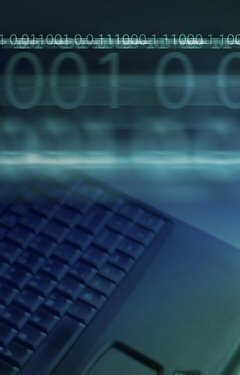
The notion that computers generate heat is familiar to everyone, but a group of physicists have discovered that, under certain conditions, computational processes can have a cooling effect. This seemingly cryptic finding, the details of which appear in Nature, relates to our basic understanding of knowledge and entropy.
The researchers, Renato Renner and Vlatko Vedral at the National University of Singapore and the University of Oxford, and their colleagues describe how the deletion of data, under certain conditions, can create a cooling effect instead of generating heat.
The cooling effect appears when the quantum phenomenon of entanglement is invoked. Ultimately, it may be possible to harness this effect to cool supercomputers that have their performance held back by heat generation. “Achieving the control at the quantum level that would be required to implement this in supercomputers is a huge technological challenge, but it may not be impossible. We have seen enormous progress is quantum technologies over the past 20 years,” said Vedral. Even with the technology available today, he believes it should be possible to do a proof of principle experiment on a few bits of data.
Back in 1961, physicist Rolf Landauer calculated that during the deletion of data, some release of energy in the form of heat is unavoidable. Landauer’s work implies that when a certain number of arithmetical operations per second have been exceeded, the computer will produce so much heat that the heat is impossible to dissipate. In supercomputers today other sources of heat are more significant, but Renner thinks that the critical threshold where Landauer’s erasure heat becomes important may be reached within the next 10 to 20 years. The heat emission from the deletion of a ten terabyte hard-drive amounts in principle to less than a millionth of a joule. However, if such a deletion process were repeated many times per second then the heat would accumulate correspondingly.
The finding comes from merging ideas from information theory and thermodynamics. Entropy appears differently in these two disciplines, which are, to a large extent, independent of each other. In information theory, entropy is a measurement of the information density. It describes, for instance, how much memory capacity a given set of data would take up when compressed optimally. In thermodynamics, on the other hand, entropy relates to the disorder in systems. In thermodynamics, adding entropy to a system is usually equivalent to adding energy as heat.
“We have now shown that in both cases, the term entropy is actually describing the same thing even in the quantum mechanical regime,” explained Renner. “Our study shows that in both cases, entropy is considered to be a type of lack of knowledge.”
The paper describes how an object’s entropy is always dependent on the observer. Applied to the example of deleting data, this means that if two individuals delete data in a memory and one has more knowledge of this data, she perceives the memory to have lower entropy and can then delete the memory using less energy. Entropy in quantum physics has the unusual property of sometimes being negative when calculated from the information theory point of view. Perfect classical knowledge of a system means the observer perceives it to have zero entropy. This corresponds to the memory of the observer and that of the system being perfectly correlated, as much as allowed in classical physics. Entanglement gives the observer “more than complete knowledge” because quantum correlations are stronger than classical correlations. This leads to an entropy less than zero. Until now, theoretical physicists had used this negative entropy in calculations without understanding what it might mean.
In the case of perfect classical knowledge of a computer memory (zero entropy), deletion of the data requires – in theory – no energy at all. The researchers prove that “more than complete knowledge” from quantum entanglement with the memory (negative entropy) leads to deletion of the data being accompanied by removal of heat from the computer and its release as usable energy. This is the physical meaning of negative entropy.
“This doesn’t mean that we can develop a perpetual motion machine,” Renner hastily adds. “The data can only be deleted once, so there is no possibility to continue to generate energy. The process also destroys the entanglement, and it would take an input of energy to reset the system to its starting state. The equations are consistent with what’s known as the second law of thermodynamics: the idea that the entropy of the universe can never decrease.”
The new connection made between the two concepts of entropy is fundamental and could lead to innovations in the field of thermodynamics as well as computing technology.
Related:
Quantum Computer Computes, While Not Operating
Naturally quantum critical material identified
Breakthrough in controlling superposition quantum states

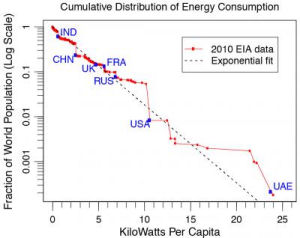
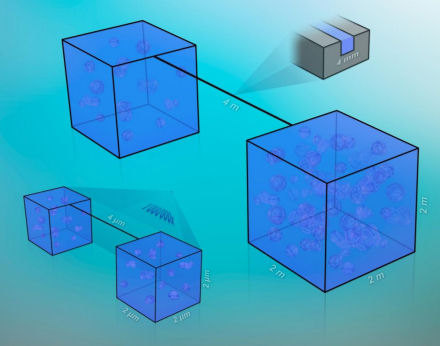
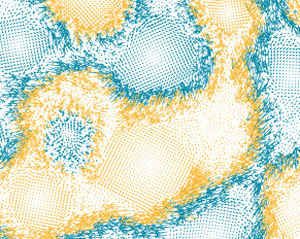
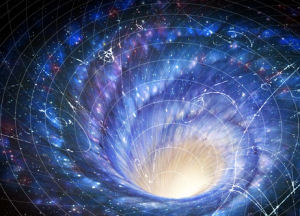

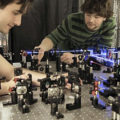

Comments are closed.